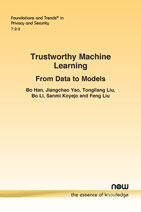Trustworthy Machine Learning: From Data to Models
By Bo Han, Hong Kong Baptist University, Hong Kong and RIKEN, Japan, bhanml@comp.hkbu.edu.hk | Jiangchao Yao, Shanghai Jiao Tong University, China, sunarker@sjtu.edu.cn | Tongliang Liu, University of Sydney, Australia and MBZUAI, UAE and RIKEN, Japan, tongliang.liu@sydney.edu.au | Bo Li, University of Illinois Urbana-Champaign, USA, lbo@illinois.edu | Sanmi Koyejo, Stanford University, USA, sanmi@cs.stanford.edu | Feng Liu, University of Melbourne, Australia, feng.liu1@unimelb.edu.au
Abstract
The success of machine learning algorithms relies not only on achieving good performance but also on ensuring trustworthiness across diverse applications and scenarios. Trustworthy machine learning seeks to handle critical problems in addressing the issues of robustness, privacy, security, reliability, and other desirable properties. The broad research area has achieved remarkable advancement and brings various emerging topics along with the progress. We present this survey to provide a systematic overview of the research problems under trustworthy machine learning covering the perspectives from data to model. Starting with fundamental data-centric learning, the survey reviews learning with noisy data, long-tailed distribution, out-of-distribution data, and adversarial examples to achieve robustness. Delving into private and secured learning, the survey elaborates on core methodologies differential privacy, different attacking threats, and learning paradigms, to realize privacy protection and enhance security. Finally, it introduces several trendy issues related to the foundation models, including jailbreak prompts, watermarking, and hallucination, as well as causal learning and reasoning. The survey integrates commonly isolated research problems in a unified manner, which provides general problem setups, detailed sub-directions, and further discussion on its challenges or future developments. We hope the comprehensive investigation presented in this survey can serve as a clear introduction for the problem evolution from data to models and also bring new insight for developing trustworthy machine learning.
Trustworthy Machine Learning: From Data to Models
The success of machine learning algorithms relies not only on achieving good performance but also on ensuring trustworthiness across diverse applications and scenarios. Trustworthy machine learning seeks to handle critical problems in addressing the issues of robustness, privacy, security, reliability, and other desirable properties. The broad research area has achieved remarkable advancement and brings various emerging topics along with the progress. This monograph provides a systematic overview of the research problems under trustworthy machine learning, covering the perspectives from data to model. Starting with fundamental data-centric learning, this work reviews learning with noisy data, long-tailed distribution, out-of-distribution data, and adversarial examples to achieve robustness.
Delving into private and secured learning, the monograph elaborates on core methodologies such as differential privacy, different attacking threats, and learning paradigms, to realize privacy protection and enhance security. Finally, it introduces several trendy issues related to the foundation models, including jailbreak prompts, watermarking, and hallucination, as well as causal learning and reasoning. This work integrates commonly isolated research problems in a unified manner, which provides general problem setups, detailed sub-directions, and further discussion on its challenges or future developments. The comprehensive investigation presented in this work can serve as a clear introduction for the problem evolution from data to models, and also bring new insight for developing trustworthy machine learning.
